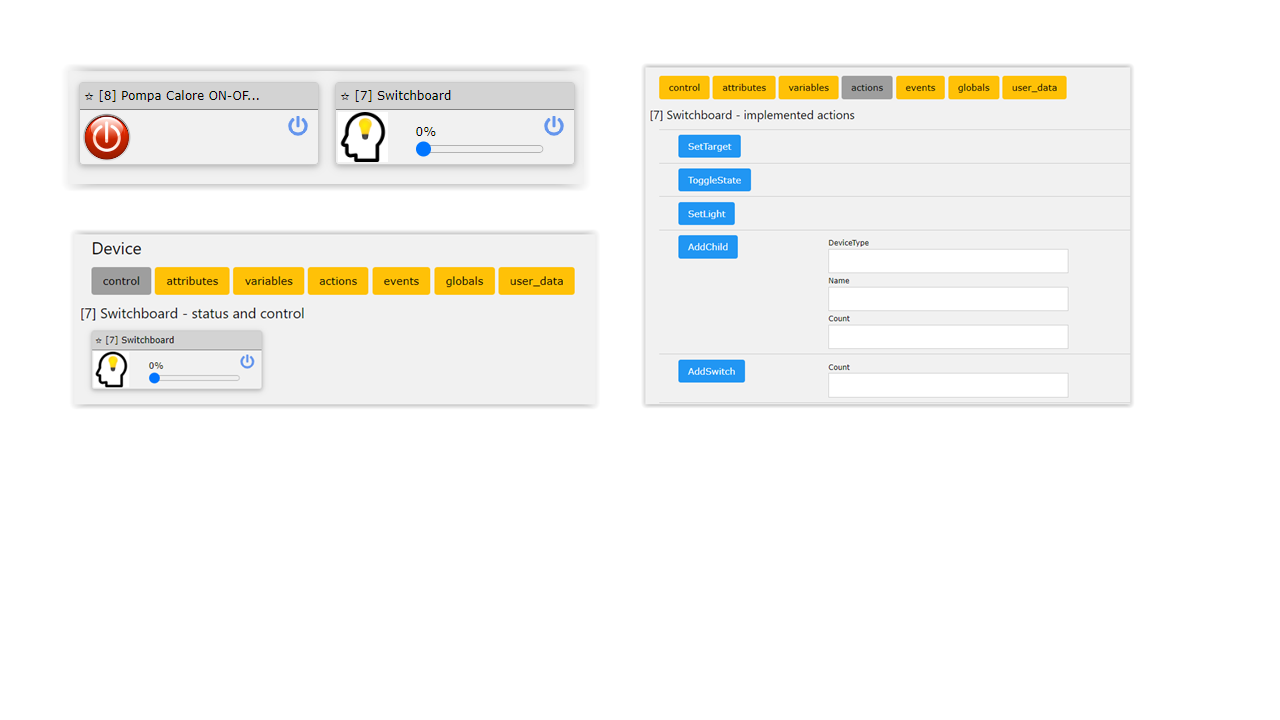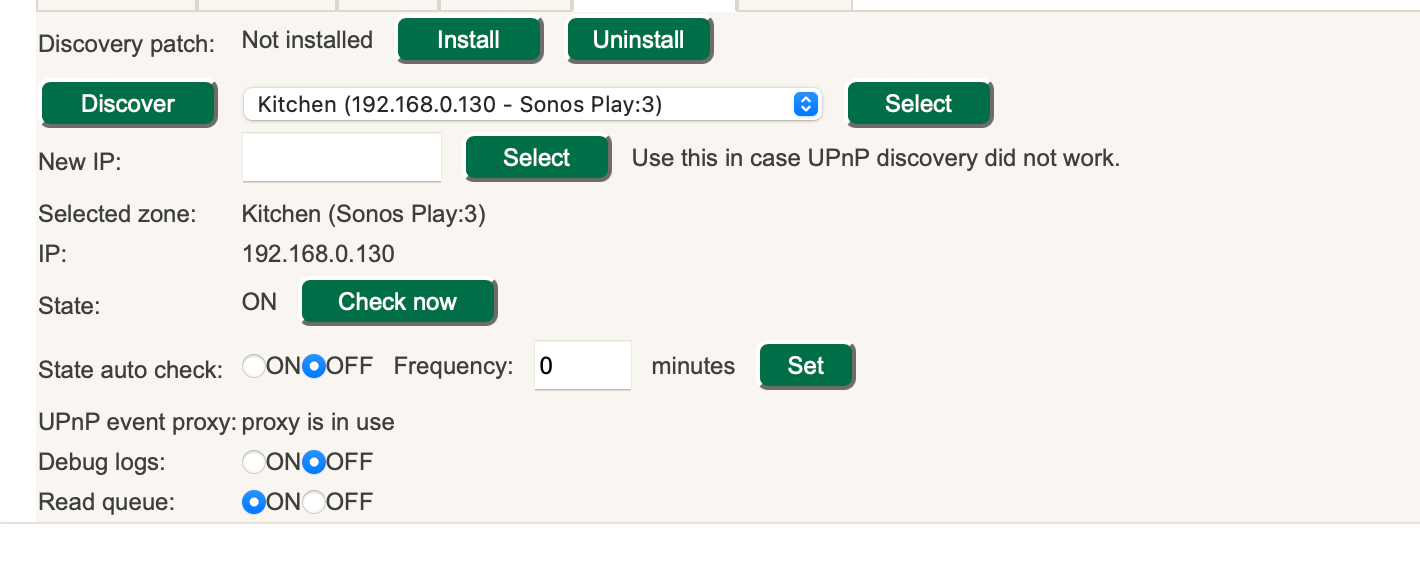upnp event proxy
-
I've made some mods to Futzle's upnp event proxy and placed it in the AltApp store (with her permission). ie it's here in GitHub.
Now it seems some people say it works with openLuup already. However the version released by Futzle required two things in order to function:
-
the file L_UPnPProxy1.lua was expected to be compressed, as it would be on a Vera eg: L_UPnPProxy1.lua.lzo
-
the hardware needs to be running OpenWrt; ie as per Vera does.
I modified the code to fix point 1) (see the script below) but I would like to see point 2) resolved, so a RasPi can be used. That is modify the script to allow a deamon to be run on a RasPi without fiddling around with say "/etc/rc.local".
So has any one got the proxy going on any hardware that is NOT using OpenWrt ? I'm unsure how to do it.
Basically this script and/or the script it includes needs to be modified or even merged to suit. You'll note that after the shebang, it requires the file "etc/rc.common" (reproduced further below). The latter appears to be some sort of template file that is overriden as required by the first script. It cites "$IPKG_INSTROOT", whatever that is. However it may be possible to make use of it somehow on a RasPi?
#!/bin/sh /etc/rc.common # Copyright (C) 2007 OpenWrt.org START=80 PID_FILE=/var/run/upnp-event-proxy.pid PROXY_DAEMON=/tmp/upnp-event-proxy.lua start() { if [ -f "$PID_FILE" ]; then # May already be running. PID=$(cat "$PID_FILE") if [ -d "/proc/$PID" ]; then COMMAND=$(readlink "/proc/$PID/exe") if [ "$COMMAND" = "/usr/bin/lua" ]; then echo "Daemon is already running" return 1 fi fi fi # openLuup: Look for the uncompressed proxy daemon Lua source. if [ -f /etc/cmh-ludl/L_UPnPProxyDaemon.lua ]; then PROXY_DAEMON_UC=/etc/cmh-ludl/L_UPnPProxyDaemon.lua elif [ -f /etc/cmh-ludl/files/L_UPnPProxyDaemon.lua ]; then PROXY_DAEMON_UC=/etc/cmh-ludl/files/L_UPnPProxyDaemon.lua # Vera 3: Else look for the compressed proxy daemon Lua source. elif [ -f /etc/cmh-ludl/L_UPnPProxyDaemon.lua.lzo ]; then PROXY_DAEMON_LZO=/etc/cmh-ludl/L_UPnPProxyDaemon.lua.lzo elif [ -f /etc/cmh-lu/L_UPnPProxyDaemon.lua.lzo ]; then PROXY_DAEMON_LZO=/etc/cmh-lu/L_UPnPProxyDaemon.lua.lzo fi if [ -n "$PROXY_DAEMON_UC" ]; then cp "$PROXY_DAEMON_UC" "$PROXY_DAEMON" elif [ -n "$PROXY_DAEMON_LZO" ]; then /usr/bin/pluto-lzo d "$PROXY_DAEMON_LZO" "$PROXY_DAEMON" fi # Close file descriptors. for fd in /proc/self/fd/*; do fd=${fd##*/} case $fd in 0|1|2) ;; *) eval "exec $fd<&-" esac done # Run daemon. /usr/bin/lua "$PROXY_DAEMON" </dev/null >/dev/null 2>&1 & echo "$!" > "$PID_FILE" } stop() { if [ -f "$PID_FILE" ]; then PID=$(cat "$PID_FILE") if [ -d "/proc/$PID" ]; then COMMAND=$(readlink "/proc/$PID/exe") if [ "$COMMAND" = "/usr/bin/lua" ]; then /bin/kill -KILL "$PID" && /bin/rm "$PID_FILE" return 0 fi fi fi echo "Daemon is not running" return 1 }And here is "etc/rc.common" as found in OpenWrt initscripts. Note the command actions it implements - in particular disable & enable, which set up Sxxy (start) & Kxxy (stop) files in the directory "etc/rc.d", which is not found in the RasPi directory structure:
#!/bin/sh # Copyright (C) 2006-2009 OpenWrt.org . $IPKG_INSTROOT/etc/functions.sh initscript=$1 action=${2:-help} shift 2 start() { return 0 } stop() { return 0 } reload() { return 1 } restart() { trap '' TERM stop "$@" start "$@" } boot() { start "$@" } shutdown() { stop } disable() { name="$(basename "${initscript}")" rm -f "$IPKG_INSTROOT"/etc/rc.d/S??$name rm -f "$IPKG_INSTROOT"/etc/rc.d/K??$name } enable() { name="$(basename "${initscript}")" disable [ "$START" ] && ln -s "../init.d/$name" "$IPKG_INSTROOT/etc/rc.d/S${START}${name##S[0-9][0-9]}" [ "$STOP" ] && ln -s "../init.d/$name" "$IPKG_INSTROOT/etc/rc.d/K${STOP}${name##K[0-9][0-9]}" } enabled() { name="$(basename "${initscript}")" [ -x "$IPKG_INSTROOT/etc/rc.d/S${START}${name##S[0-9][0-9]}" ] } depends() { return 0 } help() { cat <<EOF Syntax: $initscript [command] Available commands: start Start the service stop Stop the service restart Restart the service reload Reload configuration files (or restart if that fails) enable Enable service autostart disable Disable service autostart $EXTRA_HELP EOF } . "$initscript" ALL_COMMANDS="start stop reload restart boot shutdown enable disable enabled depends ${EXTRA_COMMANDS}" list_contains ALL_COMMANDS "$action" || action=help [ "$action" = "reload" ] && action='eval reload "$@" || restart "$@" && :' $action "$@" -
-
Can’t you just install ubuntu (it’s easy with windows subsystem for Linux , if you’re a windows user) and try it?
I will just remove this part completely and give instructions to manually install the daemon. People using openluup are usually able to do it and I’ll prefer this any day over a script messing with my config files.
-
Can’t you just install ubuntu (it’s easy with windows subsystem for Linux , if you’re a windows user) and try it?
I will just remove this part completely and give instructions to manually install the daemon. People using openluup are usually able to do it and I’ll prefer this any day over a script messing with my config files.
@therealdb said in upnp event proxy:
prefer this any day over a script messing with my config files
Totally in agreement as per:
..run on a RasPi without fiddling around with say "/etc/rc.local"
This makes some sense also:
... I do this in Lua Startup
Well it would obviously require a major rework of some of the code but some users do find installing stuff manually not so easy - including me at times! Something to perhaps think about.I really want my Sonos stuff running under openLuup.
-
@therealdb said in upnp event proxy:
prefer this any day over a script messing with my config files
Totally in agreement as per:
..run on a RasPi without fiddling around with say "/etc/rc.local"
This makes some sense also:
... I do this in Lua Startup
Well it would obviously require a major rework of some of the code but some users do find installing stuff manually not so easy - including me at times! Something to perhaps think about.I really want my Sonos stuff running under openLuup.
@a-lurker said in upnp event proxy:
Well it would obviously require a major rework of some of the code but some users do find installing stuff manually not so easy - including me at times!
Speaking of this, you can just detect openluup and stop doing the magical thing. Remember openluup can run on windows and Macos too and I'm not sure daemon could be so generalized.
-
Yep - you're right - it's in GitHub. My memory is playing tricks on me again. I read that rigpapa had it available in the AltApp store but I can't see it there - that's the bit that's missing.
In response to your question on another thread, you can start the upnp proxy from any lua platform in reality. The specific script you have for openWRT is specific only because it uses init.d and specific paths to find the daemon.
For my installation the first step was to install lxp:
sudo luarocks install LuaExpatThis assumes you already have luarocks installed. Now I run luajit instead of lua5.1 but you can run either:
luajit /etc/cmh-ludl/L_UPnPProxyDaemon.luaor
lua5.1 /etc/cmh-ludl/L_UPnPProxyDaemon.luaThis will start another instance of lua and the proxy daemon. You could even start it within openLuup as part of the startup lua I believe.
To autostart it as a service you can just create the following service file in the /etc/systemd/system folder:[Unit] Description=upnp Wants=network.target After=network.target Before=screen.service [Service] Type=oneshot WorkingDirectory=/etc/cmh-ludl ExecStart=luajit /etc/cmh-ludl/L_UPnPProxyDaemon.lua -d Restart=on-failure [Install] WantedBy=multi-user.targetI called this file upnp.service
You then just have to enable it and start it.
sudo systemctl daemon-reload sudo systemctl enable upnp && sudo systemctl start upnpchecking status:
Edit: As expected, the UPnP proxy replaced the the polling mechanism of the plugin and thereby dropped openLuup's CPU utilization by 0.1% from 1.4% to 1.3%.






